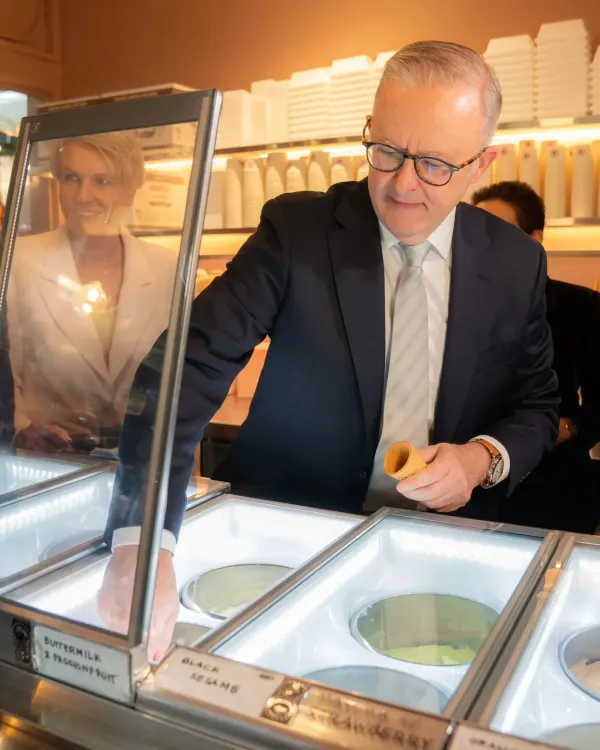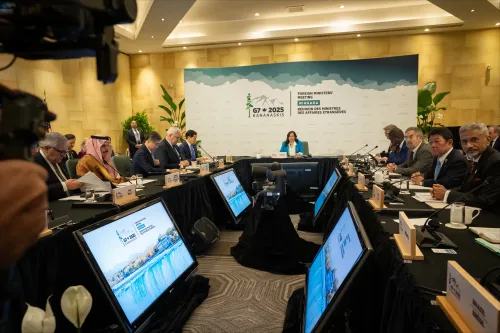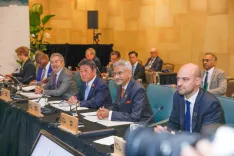Independent Candidates in Australia Demand AUKUS Inquiry Before General Election

Synopsis
Key Takeaways
- Independent candidates call for an inquiry into AUKUS.
- Potential hung parliament could give independents power.
- The Greens advocate for withdrawal from AUKUS.
- Major parties are criticized for neglecting critical issues.
- Long-term defense planning must consider all options.
Canberra, April 10 (NationPress) Independent candidates who may hold the balance of power in the upcoming Australian general election have come together to demand a parliamentary inquiry into the AUKUS security pact.
Incumbent independent Members of Parliament (MPs) Zoe Daniel and Monique Ryan, along with candidate Nicolette Boele, stated on Thursday that if they secure their respective seats in the election scheduled for May 3, they will advocate for a comprehensive inquiry into whether Australia should consider submarine options beyond AUKUS.
Should neither the ruling Labor Party nor the opposition Coalition achieve a minimum of 76 out of the 150 seats in the lower house, resulting in a hung parliament, they will need to negotiate with minor parties and independent MPs for their backing to form a minority government. This situation could grant the independents significant influence.
The Greens, Australia's third-largest political group with four current lower house MPs, have previously indicated their intention to push for withdrawal from AUKUS if they are part of a minority government.
Boele, contesting as an independent in a Coalition-controlled seat in northern Sydney, expressed her concern on Thursday that major parties are not addressing this critical issue during the election campaign. She remarked, “Since we signed AUKUS in 2021 the rules of global cooperation have changed.”
Daniel, a former journalist with the Australian Broadcasting Corporation who took a Coalition-held seat in Melbourne's southeast during the 2022 election, emphasized that reassessing AUKUS should be a top priority for the next parliament, citing a recent British inquiry established in early April.
“If it's prudent for the UK to reassess, it is essential for Australia to do the same,” she stated.
Ryan, who also won her southeast Melbourne seat from the Coalition in 2022 by defeating then-Treasurer Josh Frydenberg, echoed the sentiment on Thursday, advocating that Australia should evaluate “all contingencies and alternatives” regarding its long-term defense planning.
The independents made their announcement on the 13th day of the five-week campaign for the general election, as reported by Xinhua news agency. Australia's ties with the US have emerged as a significant issue in the election following US President Donald Trump's decision to impose extensive tariffs.
Prime Minister Anthony Albanese commented on Thursday in northeastern Queensland that it is “quite clear from the response of the markets” that these tariffs are negatively impacting the US economy.
“It is doing harm to its prospects of employment, inflation, all the key figures as well,” he added.
Coalition leader Peter Dutton remarked in Melbourne that Trump's decision to reduce tariffs on imports from numerous countries to 10 percent for 90 days reflects his “volatility.”
Dutton further stated that if he assumes the role of PM, he would discuss opportunities to “expand the trading relationship” in critical minerals and other resources that Australia can supply.
On Thursday, Labor's Minister for Climate Change and Energy, Chris Bowen, debated his Coalition counterpart, Ted O'Brien, at the National Press Club in Canberra. When questioned about the Coalition's plan to abandon Australia's current 2030 emissions reduction target of 43 percent from 2005 levels, O'Brien hinted at the possibility of withdrawing from the Paris Climate Accord if meeting climate targets would significantly damage the economy.
Under its proposal to construct seven nuclear reactors at retiring coal plant sites, the Coalition plans to eliminate the 2030 emissions target while still aiming for net zero emissions by 2050. Conversely, Labor has committed to fulfilling emissions reduction targets and decarbonization through a renewables-only strategy.









